Composition and method for inhibiting platelet aggregation
a technology of platelet aggregation and compound, which is applied in the direction of peptide/protein ingredients, extracellular fluid disorder, immune disorders, etc., can solve the problems of blockade of other vessels, pulmonary arteries, serious diseases,
- Summary
- Abstract
- Description
- Claims
- Application Information
AI Technical Summary
Problems solved by technology
Method used
Image
Examples
example 1
2′(3′)-O-((phenylaminocarbonyl)-uridine 5′-)triphosphate
[0193]Uridine 5′-triphosphate, ditributylammonium salt (100 mg, 0.176 mmol; prepared from the trisodium salt by treatment with Dowex 50W×4 H+ in water, followed by mixing the protonated species with an excess of tributylamine, stripping and lyophilization) was dissolved in dry DMF (1 mL) and phenylisocyanate (19 μL, 0.176 mmol) added. The reaction mixture was heated at 45° C. for 15 minutes, at which point a further portion of phenylisocyanate (19 μL, 0.176 mmol) was added. The solution was heated at 45° C. overnight and the DMF was removed on a rotary evaporator. The residual oil was partitioned between water (2 mL) and ethyl acetate (2 mL) and the layers were separated. The aqueous layer was extracted twice more with ethyl acetate (2 mL each) and the water was removed on a rotary evaporator. The residue was dissolved in water (1.5 mL) and the product isolated by repeated injections onto a preparative HPLC column (Alltech Nucl...
example 2
2′(3′)-O-(phenylaminocarbonyl)-P1,P4-di(uridine 5′-)tetraphosphate [“monophenylcarbamate Up4U”], Di-2′(3′)-O-(phenylaminocarbonyl)-P1,P4-di(uridine 5′-)tetraphosphate [“diphenylcarbamate Up4U”] and Tri-2′(3′)-O-(phenylaminocarbonyl)-P1,P4-di(uridine 5′-)tetraphosphate [“triphenylcarbamate Up4U”]
[0195]P1,P4-Di(uridine 5′-) tetraphosphate, ditributylammonium salt (211 mg, 0.182 mmol; prepared from the tetrasodium salt by treatment with Dowex 50W×4 H+ in water, followed by mixing the protonated species with an excess of tributylamine, stripping and lyophilization) was dissolved in dry DMF (2 mL) and phenylisocyanate (40 μL, 3.64 mmol) added in a single portion. The homogeneous reaction mixture was heated overnight at 45° C., whereupon TLC (silica gel, 50% isopropanol / 50% ammonium hydroxide) indicated a substantial conversion to two products. The solvent was removed on a rotary evaporator and the residue was partitioned between water (7 mL) and ethyl acetate (10 mL). The layers were sep...
example 3
P1,P4-Tetra-(2′(3′)-O-(phenylaminocarbonyl) di(uridine 5′-)tetraphosphate [tetraphenylcarbamate Up4U″]
[0199]This derivative was prepared according to the method of example 2. P1,P4-Di(uridine 5′-) tetraphosphate, ditributylammonium salt (200 mg, 0.172 mmol) was treated with 16 eq of phenylisocyanate (300 uL, 2.76 mmol) in DMF and stirred overnight at 35° C. The solvent was evaporated and the excess reagents removed by extraction of an aqueous solution of the product with ethyl acetate. Following preparative HPLC as previously described, 93 mg (30% yield) of the tetraphenylcarbamate was obtained.
[0200]Tetraphenylcarbamate: 1NMR (D2O, 300 MHz): δ 7.75 (d, 2H), 7.11 (m, 16H), 6.94 (m, 4H), 5.95 (d, 2H), 5.80 (d, 2H), 5.32 (m, 2H), 5.23 (m, 2H), 4.42 (m, 2H), 4.25 (m, 2H), 4.16 (m, 2H). 31P NMR (D2O, 121.47 MHz): ): δ−10.30 (m, 2P), −22.32 (m, 2P).
PUM
| Property | Measurement | Unit |
|---|---|---|
| size | aaaaa | aaaaa |
| size | aaaaa | aaaaa |
| temperature | aaaaa | aaaaa |
Abstract
Description
Claims
Application Information
 Login to View More
Login to View More - R&D
- Intellectual Property
- Life Sciences
- Materials
- Tech Scout
- Unparalleled Data Quality
- Higher Quality Content
- 60% Fewer Hallucinations
Browse by: Latest US Patents, China's latest patents, Technical Efficacy Thesaurus, Application Domain, Technology Topic, Popular Technical Reports.
© 2025 PatSnap. All rights reserved.Legal|Privacy policy|Modern Slavery Act Transparency Statement|Sitemap|About US| Contact US: help@patsnap.com



